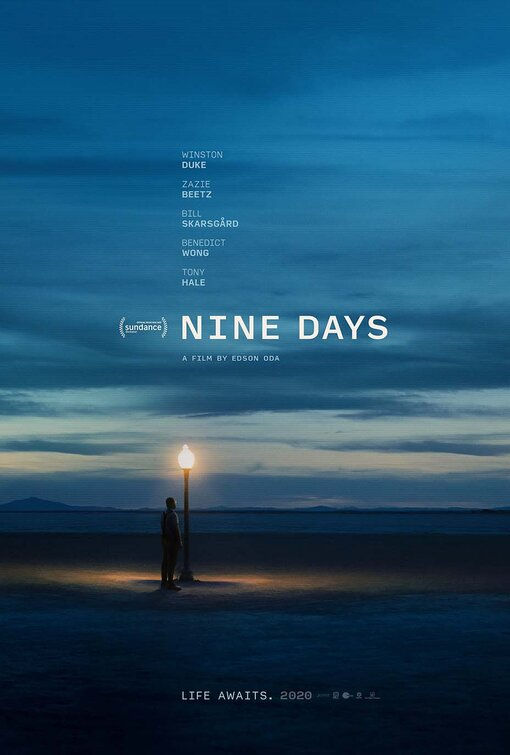NINE DAYS
Updated: Apr 24, 2022
"Good memories, bad memories, they're all just the same right now. It still hurts... In a way that no one can see and only I can feel." - Will

If you could relive one moment in your life, what would it be?
Behavioral science has spent generations conceptualizing how the past affects the present; nature vs nurture, theory of cognitive development, behavioral genetics. The amalgamation of personality, mental fortitude/fragility and trauma produces an infinite amount of perspectives. The question is, what combination of the three is the most formidable for a fruitful life? Furthermore, who gets to decide, and how has this individual’s discernment molded their outlook on what the best choice is? Edson Oda’s ‘Nine Days’ explores this concept of the perfect identity while analyzing how the context of a person’s history can alter their perception on desirability.
‘Nine Days’ centers around Will, an entity that moved on from the living world, as he conducts a series of interviews with other souls for the opportunity to be born. He administers a multitude of hypotheticals and psychological tests throughout a period of nine days. It is discovered that Will himself was also chosen in the same process, but that his time on Earth was difficult and emotionally scaring. As these days progress, Will battles the demons he experienced in the living world while juggling which soul deserves the gift, or curse, of life.
An important aspect of this film is the pacing and the ambiance. Will resides in a quaint ranch-style home, with minimal furniture and a white picket fence set in the middle of a desert wasteland. He watches the lives of the souls he’s already chosen through a series of old box set TV's stacked on top of each other in his living room. The calming, plain setting leaves nothing to distract the viewer. The pacing of the film is almost transient, allowing each soul's personality to blossom and fill the empty, pastoral landscape. Will administers difficult tests, but does it in a safe space through comforting conversations. The tranquility of the house is needed for each soul to flourish, they need to feel comfortable, and in doing so the film provides a sense of familiarity that allows the dialogue and the characters to provide what feels like a real time therapy session.
At first, the question being asked is - what makes a soul uniquely qualified to be born over others? Resilience? Bravery? Kindness? It appears that each soul introduced embodies a different type of thinking style, matched with a distinctive set of characteristics. Their answers are dissimilar, their reactions vary in different situations. The variable that changes this question, is Will. Having lived before the question is no longer an objective one. The question then becomes, what is Will’s idea of the the perfect qualifications?
Being the cinematic embodiment of contemplation, ‘Nine Days’ adds a further layer of introspection through Will's trauma. Adding a variable of subjectivity to the equation produces a real life element to the otherwise metaphysically driven narrative. Humans inherently make decisions emotionally instead of pragmatically, so as piece by piece of Will's trauma is exposed, it explains why he only sends flowers instead of pigs, why he always chooses the vulnerable instead of the valiant. The idea of past experiences influencing present day decisions in this scenario poses a universally philosophical conclusion; the perfect soul doesn't exist, everyone's own trauma will manipulate their own idea of perfection. It is because of Will's flawed impression of reality that humanizes him, he has to choose who he believes has the most optimal trajectory for success.
Creating each soul to embody how their outlook will be in the living world, Oda never vilifies one perspective over another. One of the most impactful scenes happens towards the end of the film, when Will invites two souls over for dinner. After some laughs and light conversation, the two souls have a disagreement. Kane, strong minded and pragmatic, states the world is a dark and sad place riddled with death and misery. Emma, affectionate and inquisitive, doesn’t understand why Kane only looks at the negative, why he can’t see the beauty, love and potential there is. The two souls have watched the same footage in Will’s living room, have been asked the same questions, have been given the same assignments, and yet, both of them have decided to view the world differently. A stunning metaphor not only about how each person can process the same situation differently, but also how an outsider can see how both viewpoints are valid. Both prove a point, it’s a matter of personal opinion on which one is more profitable to have.
‘Nine Days’ sucks you in as an innocent bystander and spits you out as an emotionally wrecked proficient. What starts off as a relatively simple elimination style process turns into a deep, introspective journey about life and survival. Giving the feeling of reaching out and giving you a warm hug, Oda balances the contemplative nature of the human soul through undemanding story arcs. Never underestimate this manageable play-by-play narrative style, because hidden in between all of these home-style nuances, is a deeply intricate and cognizant exposure into the complexities of human nature.
.jpeg)
Yorumlar